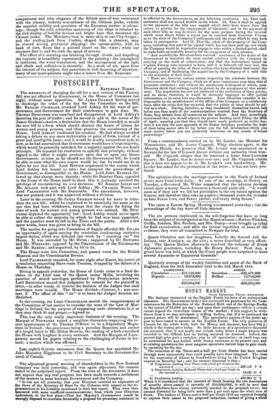POSTSCRIPT.
SATURDAY NIGHT.
The marneuvre of changing the old for a new version of the Factory Bill was not effected by Government, in the House of Commons last night, without some opposition. Sir JAMES GRAHAM having moved to discharge the order of the day for the Committee on the Bill, Mr. BAILLIE COCHRANE attacked Lord Ashley for his want of per- severance, and Government for their contrivance to gain time. Mr. Tiromas DUNCOMBE was surprised and disappointed at Lord Ashley's deserting his post of leader ; and he moved to add to the terms of Sir James Graham's motion, a declaration that the House intended to mould the new bill in a form which should shorten the hours of labour for women and young persons, and thus preserve the consistency of the House. Lord ASHLEY vindicated his conduct. He had always avoided taking a debate on any mere technicality or point of form, instead of a great and intelligible issue ; and it would be doubly inexpedient to do so now, as he had ascertained that Government would have a large majority, which would be generally mistaken for a majority against the ten-hours principle. He repeated his resolution to uphold that principle, without regard to the effect it might produce upon this or upon any future Government: as soon as he should sue the Government bill, he would be able to state what his own course would be, but he could not do so before he saw that bill. Lord HOWICK acquiesced in the course which Lord Ashley felt bound to take ; but censured the proceedings of Government, as disrespectful to the House. Lord Jona RUSSELL fol- lowed up that charge more sharply ; while Sir ROBERT PEEL appealed to the forms of the House itself to show that it jealously retained the privilege of reconsidering its own decisions. Sir ROBERT INGLIS and Mr. ACLAND took part with Lord Ashley ; Mr. CHARLES WOOD and Lord PALMERSTON with Mr. Duncombe. The amendment, however, was not pressed, and it was negatived without a division.
Later in the evening, Sir JAMES GRAHAM moved for leave to intro- duce the new bill ; which he explained to be essentially the same as the one that had been withdrawn, except that the clause for fixing the time of work for women and young persons was omitted. Mr. Doe- mane deplored the opportunity lost : Lord Ashley would never again be able to collect the majority by which he had now been supported, and the question mast be left to the Times and the public. After a few more words, leave was given to bring in the bill.
The motion for going into Committee of Supply afforded Mr. EWART an opportunity of again moving the resolution condemning exclusive import-duties, which was defeated last week by " counting out " the House. It was seconded by Mr. HOME ; supported by Dr. BOWRING and Mr. WILLIAMS; opposed by the CHANCELLOR of the EXCHEQUER and Mr. BARING ; and negatived, by 88 to 24.
The House went into Committee, and passed votes for the British Museum and the Commissariat Service.
Lord PALMERSTON renewed, for some night after Easter, his notice of a resolution respecting Slave-trade Treaties, dropped by the failure of a House on Thursday.
Sitting in appeals yesterday, the House of Lords came to a final de- cision on the Irish case of the Queen versus Millis, involving the question of mixed marriages performed by Presbyterian ministers. Lord BROUGHAM moved that judgment be entered for the plaintiff in error,—in other words, to reverse the decision of the Judges that such marriages were invalid. The House divided—Content, 2 ; non-con- tent, 2. The effect of this " tie" is to leave the Judges' decision un- disturbed.
In the evening, the LORD CHANCELLOR moved the reappointment of the Committee of last session to consider the state of the Law of Mar- riage in Ireland, for the purpose of suggesting such alterations in it as they may think fit and proper.—Agreed to.
This was the only really important business of the evening. The Marquis of NORMANDY raised a resultless discussion respecting the re- cent appointment of Mr. Thomas O'Brien to be a Stipendiary Magis- trate in Ireland ; the gentleman being a quondam Repealer, and author of a turgid letter to Mr. Dillon Browne, the reading of which convulsed the House with laughter at every sentence. And the Marquis of LANS - DOWNE moved for papers relating to the challenging of Juries in Ire- land; a motion which was affirmed.


























 Previous page
Previous page